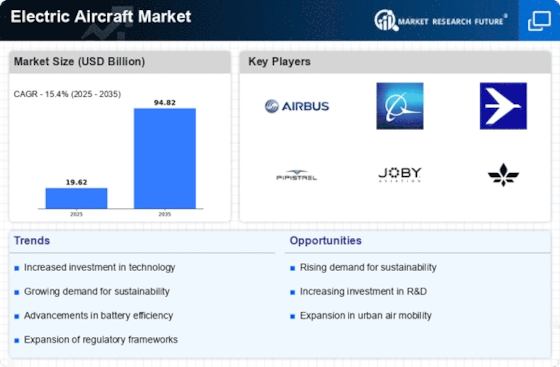Top Industry Leaders in the Electric Aircraft Market

Key Players:
Airbus SE (Netherlands)
Elbit Systems Ltd (Israel)
AeroVironment Inc (US)
Strategies Adopted: The strategies employed by key players in the electric aircraft market are diverse, reflecting the unique challenges and opportunities within the industry. Established aerospace companies are leveraging their experience and resources to develop hybrid and fully electric aircraft, often collaborating with technology partners and government agencies. Startups, on the other hand, are focusing on agile development processes, rapid prototyping, and securing strategic partnerships to accelerate their market entry. The emphasis on collaboration is evident, with many companies forming alliances with electric propulsion system manufacturers and battery technology experts to ensure the seamless integration of electric components into their aircraft.
Factors for Market Share Analysis: Several factors contribute to the market share dynamics in the electric aircraft sector. Technological prowess, manufacturing capabilities, regulatory compliance, and the ability to scale production play pivotal roles. Companies with a strong focus on research and development, consistently delivering cutting-edge innovations, are positioned to gain a competitive edge. Additionally, strategic partnerships and collaborations with regulatory bodies can expedite the certification process, a critical factor in the market where safety and compliance are paramount. Market share analysis also considers the global reach of companies, as those with a broader market presence can capitalize on diverse regional opportunities.
New and Emerging Companies: The electric aircraft market is witnessing a surge in new and emerging companies eager to capitalize on the industry's growth potential. Vertical Aerospace, a UK-based eVTOL manufacturer, has gained attention with its advanced prototypes and successful test flights. EHang, a Chinese autonomous aerial vehicle (AAV) company, is making strides with its passenger drones and autonomous air taxis. Joby Aviation, a U.S.-based startup, has attracted significant investment and attention for its eVTOL aircraft designed for urban air mobility. These emerging players bring fresh perspectives and disruptive technologies, challenging traditional aerospace incumbents.
Industry News: Industry news in the electric aircraft sector is dynamic, reflecting the rapid pace of technological advancements and regulatory developments. Recent breakthroughs in battery technology, such as solid-state batteries, promise increased energy density and improved safety, addressing one of the key challenges in electric aviation. Regulatory agencies are actively working to establish certification standards for electric aircraft, paving the way for commercial deployment. High-profile partnerships and collaborations, such as those between Boeing and Wisk Aero, showcase the industry's collaborative spirit and commitment to driving innovation.
Current Company Investment Trends: Investment trends in the electric aircraft market underscore the sector's attractiveness to both traditional aerospace investors and those looking to diversify their portfolios. Venture capital firms, private equity, and corporate investors are pouring funds into companies at various stages of development. Startups with promising prototypes and advanced technologies are securing substantial investments to accelerate their production timelines and market entry. Established aerospace companies are allocating significant resources to electric aircraft research and development, recognizing the transformative potential of electrification in aviation.
Overall Competitive Scenario: The overall competitive scenario in the electric aircraft market is characterized by a delicate balance between established players, startups, and cross-industry collaborations. While traditional aerospace giants bring decades of experience, vast resources, and global reach, startups offer agility, innovation, and disruptive technologies. Strategic collaborations between these two categories are becoming increasingly common, as evidenced by partnerships between Boeing and startups like SkyDrive. The competitive landscape is further shaped by regulatory developments, with companies that can navigate the certification process swiftly gaining a competitive advantage.
Company News :
Startups like Joby Aviation and Lilium are disrupting the market with their electric vertical takeoff and landing (eVTOL) designs, showcasing the industry's evolution towards urban air mobility. Additionally, established electric vehicle manufacturers like Tesla are exploring opportunities in the electric aircraft space.
Archer Aviation (ACHR):
Secured a multi-million dollar contract with United Airlines for delivery of electric vertical takeoff and landing (eVTOL) aircraft, marking a major milestone for commercial viability.
Completed successful test flights of its Maker aircraft, further validating its design and performance capabilities.
Eviation Aircraft:
Unveiled its Alice commuter aircraft prototype, showcasing its sleek design and extended range capabilities for regional transport.
Secured a major order from Meta (formerly Facebook) for use in its internal flight network, highlighting the potential for corporate applications.











